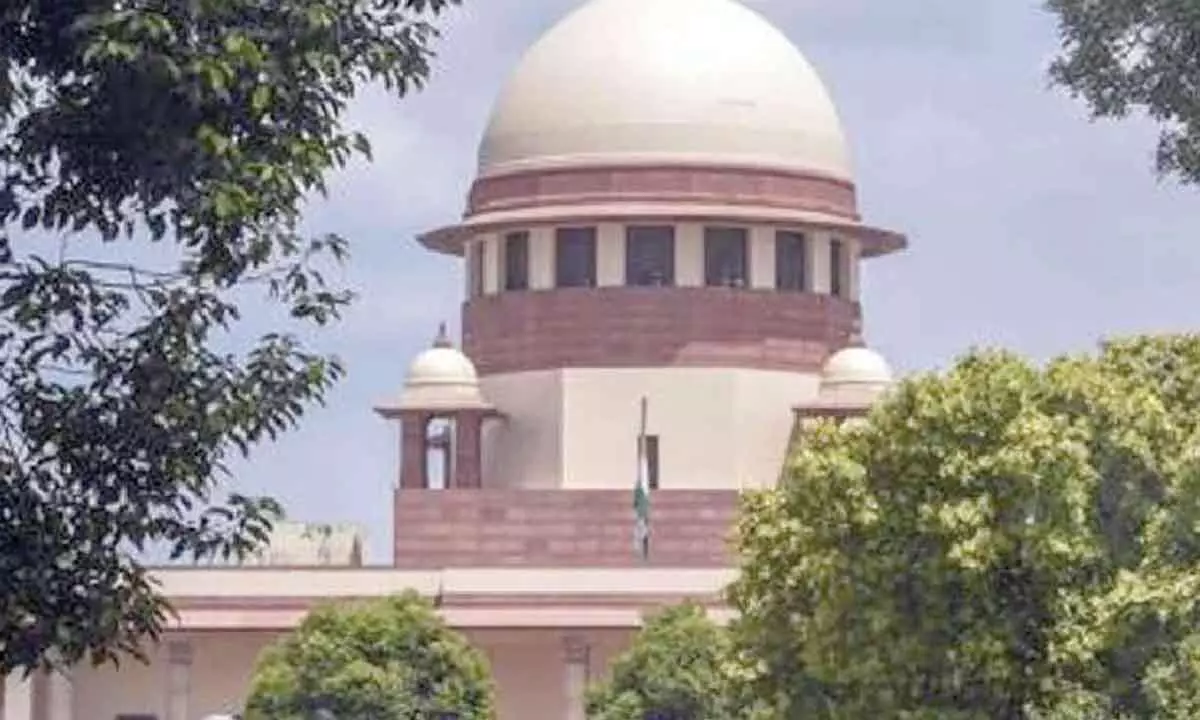Live
- 59 pc people seek GenAI smartphones by 2025 end globally: Report
- Crime Rate in Rachakonda Increases by 4% in 2024, Cybercrimes Surge by 42.5%
- AIM, Niti Aayog’s Youth Co:Lab challenge 2025 to foster innovation for disabled
- IIT Delhi students receive job offers from US, UK, UAE, Japan in abundance
- Pushpa 2 Leads to the Capture of Notorious Gangster Vishal Meshram in Nagpur
- WhatsApp to End Support for Older Android Phones From January 1, 2025
- CM Stalin Slams BJP-Led Government Over Election Rules Amendment
- Necrophilia: Chhattisgarh HC Observes Loophole In Indian Penal Code
- Jaipur tanker blast: Vasundhara Raje meets kin of injured, follows medical protocol
- AAP-BJP Showdown Ahead Of Delhi Assembly Elections
Just In
SC orders strict action against illegal construction


The Supreme Court has given a significant judgment to curb illegal buildings, a major problem facing almost all cities and towns in the country.
Bengaluru : The Supreme Court has given a significant judgment to curb illegal buildings, a major problem facing almost all cities and towns in the country. It has also issued a 12-point guideline to address the problem of unauthorised buildings and has ordered that they be strictly followed.
Accordingly, no bank should provide loan facilities to those who construct buildings in violation of the rules without obtaining an Occupancy Certificate (OC) and Completion Certificate (CC). Such buildings should not be provided with electricity and water connections. However, it has issued several strict rules, including that if this facility is provided, it will be self-contempt of justice.
The division bench of Justices J B Pardiwala and R Mahadevan, who had discussed the illegal building problem at length in the case of Rajendra Kumar Barjatya and others vs. Uttar Pradesh Evas Evam Vi-kas Parishad, gave this order with wide-ranging implications.
The trend of constructing buildings in violation of the plan and building them in a hurry should not be encouraged. Everyone must follow the code of conduct. If the rules are violated, such matters should be brought to the notice of the courts. In such cases, punishment should be given with strict hands, not mercy, the court said.
Also, “Illegal buildings should not be ‘protected’ by taking into account administrative failure, construc-tion cost and investment, negligence of officials and other factors. State governments sometimes take the initiative to regularize such unauthorized buildings. But such a plan should be done only in rare cases. The government will have to pay attention to the far-reaching consequences and the adverse effects on the development of the city,”the court warned.
Also, the Supreme Court has directed that these guidelines be effectively implemented. The court, which has directed that a copy of the judgment be sent to the registrars of the High Court, has di-rected that the High Courts should henceforth refer to this judgment in cases of unauthorized build-ings, building plans, violation of approvals and other disputes. It has also said that a copy of the judg-ment should be sent to the Chief Secretaries of all the states and Union Territories. The governments have been directed to forward this order to all the Municipal Corporations and Local Bodies and strictly follow the guidelines when it comes to illegal buildings.
The Supreme Court has issued 12-point guidelines to address the problem of unauthorized buildings, and it has ordered that all of them should be followed without fail. What are those guidelines?
Before the approval of the building plan, the builder and owner should obtain completion and posses-sion certificates from the concerned authority. Only then should an undertaking be written that they will be handed over to the owners and beneficiaries.
The builder, developer and owner should display the approved plan in front of the building.
The concerned officials should regularly visit the construction site and conduct inspections to check whether the rules are being followed or not. If any violation is found, CC and OC should not be issued until it is rectified.
Necessary infrastructure including electricity, water and sewerage connections should be provided only after the submission of CC and OC.
Even after the completion certificate is issued, if it is found that the construction has been done in vio-lation of the map, action should be taken against the officer who issued the CC.
No permission or license should be given to conduct business or commercial transactions in any illegal building.
The construction of the building should be in accordance with the zone plan, and if the plan needs to be changed, it should also be in accordance with the rules.
The government should take disciplinary action against officials who are aware of the construction of unauthorized buildings but do not take action against them.
If the builder or owner files an appeal that the CC and OC were not issued, it should be disposed of as per the rules within 90 days.
The state governments should direct the officials to strictly follow all orders and directions issued by the courts regarding unauthorized buildings.
Banks should verify the CC and OC certificates of such illegal buildings before giving loans. Violation of these directions will result in contempt of court proceedings as per the rules.

© 2024 Hyderabad Media House Limited/The Hans India. All rights reserved. Powered by hocalwire.com






